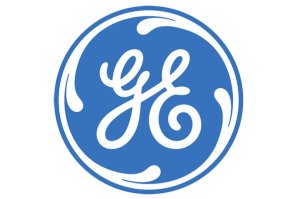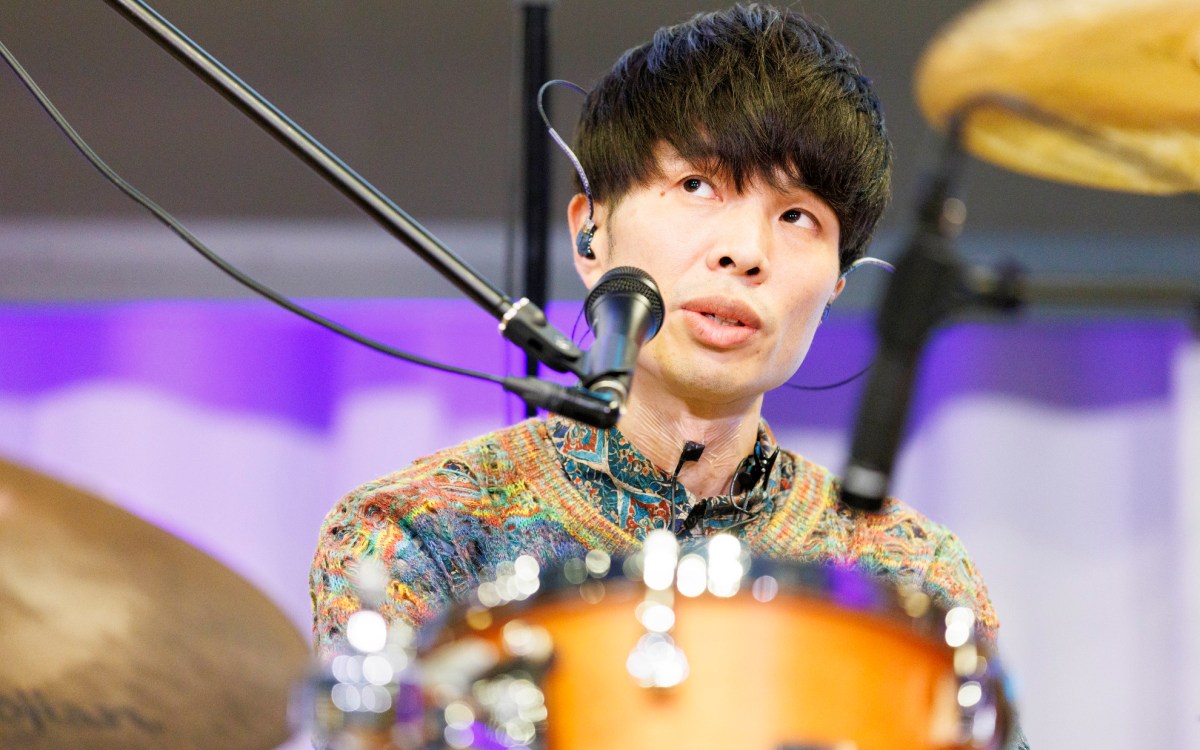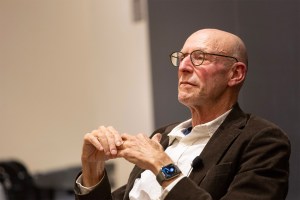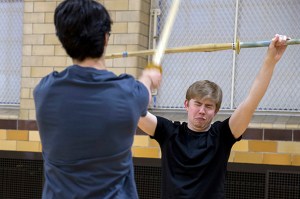Year: 2016
-
Nation & World
Lessons in learning
At the Global Education Conference, HGSE students presented papers on how to improve educational opportunity around the world.

-
Science & Tech
How, not why, the human brain folds
Researchers at the Harvard John A. Paulson School of Engineering and Applied Sciences, collaborating with scientists in Finland and France, have shown what ultimately causes the brain to fold — a simple mechanical instability associated with buckling.
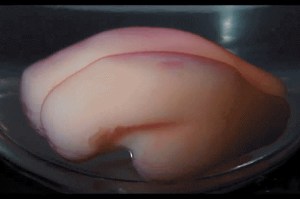
-
Arts & Culture
Light beyond violence
Harvard Divinity School Professor Matthew Potts probes religious themes in novels of Cormac McCarthy
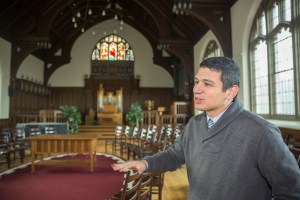
-
Arts & Culture
Hate draws a forceful response
The documentary “Waking in Oak Creek” was the final installment of the Religion Refocused series, sponsored by the Pluralism Project at Harvard. The screening was aimed at bringing the conversation around the incident to Cambridge, as was a panel discussion afterward.

-
Campus & Community
Harvard University Housing establishes new rents for 2016-17
In accordance with University policy, Harvard University Housing charges market rents. To establish the proposed rents for 2016-17, Jayendu Patel of Economic, Financial & Statistical Consulting Services performed and endorsed the results of a regression analysis on three years of market rents for more than 4,400 apartments.
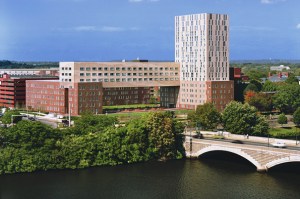
-
Campus & Community
Warm welcome for Washington
For the 66th year, Hasty Pudding Theatricals named a Woman of the Year, and this time, there was some scandal in the air.

-
Science & Tech
New World devastation
A new study led by Harvard’s Matthew Liebmann examines the health and ecological consequences of European colonists’ contact with Native Americans.
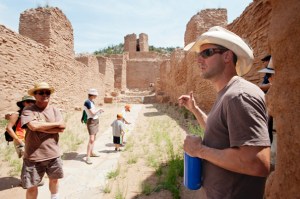
-
Campus & Community
New dean finds strong foundation at HKS
Douglas Elmendorf, the new dean of Harvard’s John F. Kennedy School of Government, talks about his return to academia and weighs in on where HKS is headed.
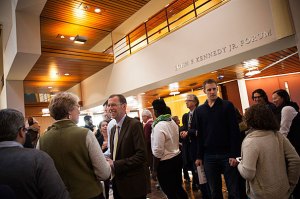
-
Campus & Community
The way of the sword
During Wintersession 2016, the Harvard-Radcliffe Kendo Club offered a three-day kendo crash course called “Introduction to Japanese Sword Fighting.”
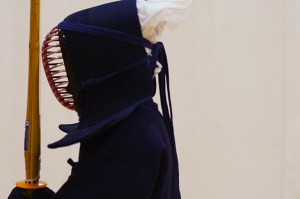
-
Health
A cancer’s surprise origins, caught in action
Researchers have found that cancer begins after activation of an oncogene or loss of a tumor suppressor, and involves a change that takes a single cell back to a stem cell state. They believe this model may apply not only to melanoma, but to most if not all cancers.
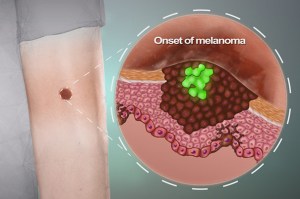
-
Campus & Community
Faculty Council meeting held Jan. 27
On Jan. 27 the members of the Faculty Council heard presentations on concussion management and on faculty research funds. They also voted to approve a joint program in jazz with the Berklee College of Music and discussed proposed legislation regarding the General Education Program.
-
Campus & Community
Janet Yellen named Radcliffe Medalist
Janet L. Yellen, chair of the Board of Governors of the Federal Reserve System, will receive the Radcliffe Medal during Radcliffe Day on May 27.

-
Campus & Community
Winthrop House addition honors alumnus
New Winthrop House addition will be named Robert M. Beren Hall, in honor of alumnus.
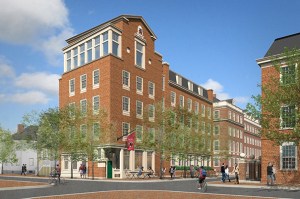
-
Arts & Culture
For the love of theater
Amy Brenneman and Sabrina Peck, who connected over their love of theater while undergrads at Harvard, are longtime collaborators. Last week they came back to Harvard to teach a workshop on how to create original theater from personal experience.
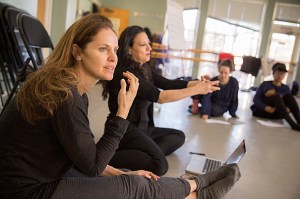
-
Nation & World
中国最慷慨的百名慈善家
近几十年来中国逐步成长为全球经济引擎,其重要性日益加剧。关于该国经济增长的任何风吹草动,或诸如最近几周的股市波动,都会撼动国际市场。伴随中国经济的迅猛增长,很多人积累起了巨额财富。然而,关于第一代白手起家的富翁以及他们是如何回报社会的,却鲜有报道。 现在,哈佛大学肯尼迪政府学院艾什民主治理与创新中心的研究员们首次勾勒了中国大陆2015年前100位捐赠者的慈善行为。研究不仅涵盖他们的身份以及财产,还包括他们自身所处的行业、捐赠额、所支持的行业以及受益的领域。 “人们现在极其关注中国最富有人群的行为习惯。三十年前,每个人都一样的贫穷,” 领导此项目数据收集和网站设计的哈佛大学肯尼迪政府学院公共管理硕士毕业生、艾什民主治理与创新中心研究员魏沛然说道。“在慈善行业,诸如捐赠领域和受益群体等数据,不仅对于普通人,而且对于政府、企业和想要为这个社会做出贡献的人都是一件非常重要的工具。慈善家的影响力和财力确实很重要。” 最新成立的“中国慈善项目”及其相关网站旨在为不断进行的关于中国慈善捐赠模式和趋势的研究提供重要的交互性数据,并成为一个服务非营利性组织、政府、学术界和媒体的数据库。研究员们希望通过具体量化慈善家年度捐赠数据,以帮助未来捐款人在做捐赠决定时,能做出更正确的选择,同时也希望能够通过建立“慷慨指数”在慈善家之间建立起良性竞争。 “新兴富裕阶层非常关注如何更有效并有意义地进行捐赠,” 魏沛然还说,“因为他们是第一代富起来的人,所以他们对什么是回馈社会的最好方法了解并不多。” “中国正处在镀金时代,而中国缺乏美国在镀金时代的宗教基础和价值体系……因此并不存在关于如何及怎样捐赠的行为守则,”哈佛大学肯尼迪政府学院艾什民主治理与创新中心中国项目主任康义德说:“这也是为什么我们应该引导他们的捐赠行为。” 报告显示,上榜的前100名慈善家中绝大多数为男性,平均年龄为54岁,多数来自于商业和政府活动频繁的富裕省市,例如广东、北京和福建。上榜慈善家们更倾向于资助位于其家乡的机构,这也意味着西藏、新疆和云南等贫困地区鲜少受益。 乘着快速城镇化带来对住房急剧需求的东风,榜单上的许多慈善家靠房地产生意致富。大多数房地产业的慈善家们选择通过在顶级学府设立奖学金、冠名教学楼等方式捐助教育产业。令人意外的是,尽管中国空气污染问题严重,但榜单上的慈善家们很少捐助环保组织。针对此现象,魏沛然的解释为,对慈善家来说,资助带来高社会效益且立竿见影的教育产业远比捐赠解决空气污染、水污染等极具挑战性且需长期努力的环保项目更具吸引力。 魏沛然指出:“毫无疑问,慈善家们希望看到自己在榜单中的排名,并关注其他慈善家的动向,并且了解如何在未来做得更好。我认为,政府对这样的榜单也会很感兴趣,因为以前从未有过对慈善活动的地域属性做如此详尽分析的报告。”他还提到:“我们研究慈善家地域属性的另一个原因是为非政府组织提供便利。通过我们的报告,非政府组织能够清晰地了解,每年各个地区对慈善投入最大的慈善家是谁。” 因为中国的慈善事业相对年轻,因此与捐赠有关的记录非常分散,几乎没有类似捐赠者数据库或美国国税局990表这样的权威数据来源。研究员们通过各种渠道对数据进行广泛验证,包括各种公开信息、媒体报导、访谈以及其他官方渠道。 宏观上看,中国慈善行业规模还相对很小。2014年,中国全国慈善捐赠总额占国内生产总值的比重为0.1%。在美国,该比例为2%。印度为0.4%,俄罗斯则为0.01%。中国是全球第二大经济体,“因此对于中国人来说,前路漫长,” 魏沛然说道。 在经历了过去十几年的经济和社会巨变后,中国富有精英们有很强的意愿希望将其个人和家庭传承下去,而并不是为了获得很少的税收优惠而捐赠。 “我认为他们这样做的部分动????是为自己的子女及后辈创造一个路线图,不仅是如何回馈社会,更重要的是给后辈灌输什么是最重要的事,”康义德说。“他们深深担忧第二代,更别说第三代子孙,担心他们并不会非常成功。这并不仅因为他们无须经历同样的经济困难和文革时期的心理创伤,而是他们缺乏来自于中国传统社会紧密社会联系的好处。” 魏沛然说,很多中国富豪对美国的富豪感动好奇,比如洛克菲勒家族,他们也对美国慈善领域的优秀实践感兴趣。他们中的很多人已经建立了自己的基金会,也会参考美国慈善家安德鲁·卡内基和范德比尔特的做法。“在美国有效的实践可能在中国不奏效,所以他们必须拿出适用于中国社会的解决方案,”魏沛然说。 这一代富豪从旧有的共产主义经济体制的私有化过程中受益,这有着重要的社会意义,比如新兴富有阶层如何与政府互动,康徳义说。“一个重要的问题是,这些富豪在中国更为广泛的政治、社会、经济领域中扮演何种角色。” 因为财富集中程度很高,资本外流始终是个让中国政府担忧的问题。中资银行纷纷开发私人理财产品,以满足富有人群需求,并防止他们把资本转向欧美银行。“很长时间以来,人们都很关注这类人群的需求、期望以及动机,因为他们具有显著的经济影响力,”康义德说。 现在中国的慈善家们已经积攒起大量财富,他们正想方设法希望通过个人的力量,建立起自身基金会,从而解决区域之间不均衡的问题,“但是他们要跟政府打交道,而政府尚未建立起允许这种职业化行为发生的法规,” 康义德说。 “他们在充满挑战和困难的政策环境下运作,因此尚不清楚他们如何得以可持续地发展,” 康义德说,“这就是为什么前路漫长的原因。”
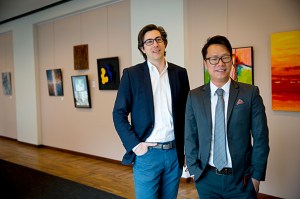
-
Science & Tech
Mechanical stimulation shown to repair muscle
Harvard research teams find a promising new approach that uses direct mechanical stimulation to repair severely damaged skeletal muscles.

-
Nation & World
China’s top 100 philanthropists
Harvard Kennedy School researchers’ efforts provide a deep look into the most generous of China’s first generation of billionaires, what they’re doing with their wealth, and why.
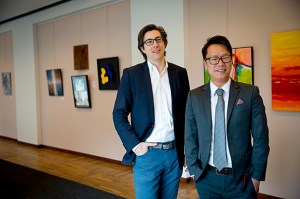
-
Campus & Community
Debate duo makes it to grand finale
In 2012, Fanelesibonge Mashwama ’17 and Bo Seo ’17 met on a bus in South Africa en route to an international debate tournament. Little did they know that fate would lead them from two different continents to Harvard, to Pforzheimer House, and ultimately to triumph earlier this month at the World Universities Debating Championship (WUDC),…
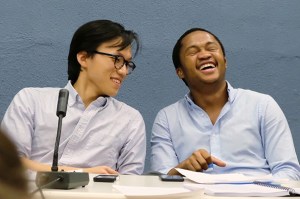
-
Health
Potential diabetes treatment advances
Researchers at MIT’s David H. Koch Institute for Integrative Cancer Research, in collaboration with scientists at the Harvard Stem Cell Institute and several other institutions, have developed an implantable device that in mice shielded insulin-producing beta cells from immune system attack for six months — a substantial proportion of life span.
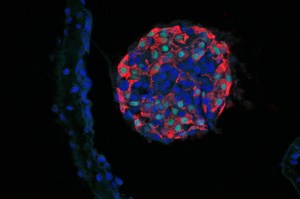
-
Science & Tech
4D-printed structure changes shape when placed in water
A team of scientists at the Wyss Institute for Biologically Inspired Engineering at Harvard University and the Harvard John A. Paulson School of Engineering and Applied Sciences (SEAS) has evolved their microscale 3-D printing technology to the fourth dimension, time.
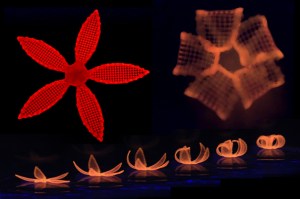
-
Campus & Community
Presidential Public Service Fellows tackle big issues
Combating pregnancy discrimination. Reducing racial disparities in obesity rates. Working on the front lines of the opiate epidemic. These are a few of the experiences undertaken by Harvard’s Presidential Public Service Fellows. The deadline to apply for the 2016 fellowships is Feb. 8.
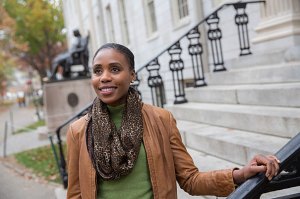
-
Nation & World
Entrepreneurial women
It’s harder for entrepreneurial women to raise startup capital, but speakers on a Harvard Business School panel say there are paths through the maze.
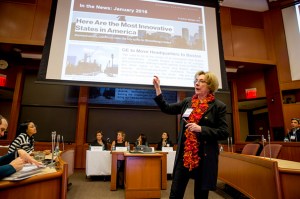
-
Nation & World
Taking people ‘to where they want to be’
At HLS’s Community Enterprise Project, students provide free legal services to people who want to start small businesses and, in the process, they help communities prosper.
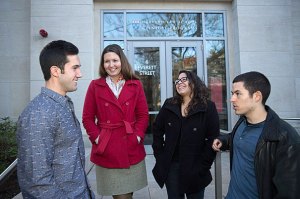
-
Arts & Culture
Striving for imperfection
Radcliffe fellow, composer, and sound artist Reiko Yamada’s interactive sound installation “Reflective” invites visitors to interact with piano music composed by Harvard Professor Vijay Iyer. The music changes depending on the direction of the visitor’s steps.
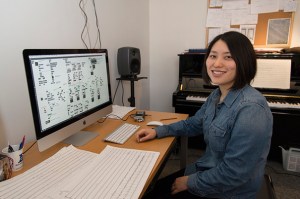
-
Campus & Community
Harvard, HUCTW agree on new contract
Harvard University and the Harvard Union of Clerical and Technical Workers announced today that they have reached a tentative agreement on a new three-year contract to provide HUCTW employees with an annual pay increase program, changes in health plan design, and other constructive policy initiatives.
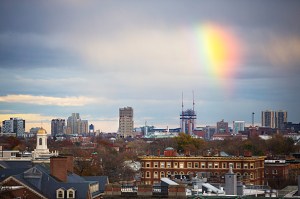
-
Health
$28M challenge to figure out why brains are so good at learning
Harvard’s John A. Paulson School of Engineering and Applied Sciences, Center for Brain Science, and Department of Molecular and Cellular Biology have been awarded more than $28 million to develop advanced machine learning algorithms by pushing the frontiers of neuroscience.
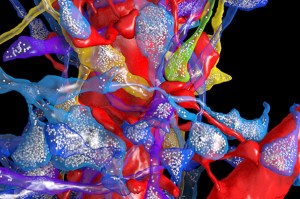
-
Work & Economy
Doing his job
Bill Belichick’s endlessly efficient management style holds lessons for business

-
Campus & Community
Two professors win Wolf Prize
Harvard professors C. Ronald Kahn and Stuart L. Schreiber have won the Wolf Prize, considered the most prestigious award in science after the Nobel Prize and the Lasker Award.

-
Nation & World
‘A win-win situation’
General Electric’s decision to move its headquarters to Boston is seen as a boon to the region, fueled in part by area’s intellectual strengths.
